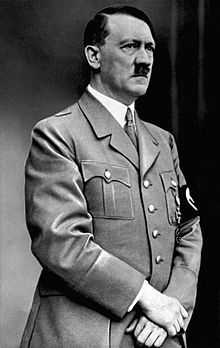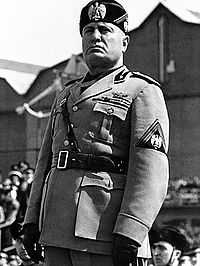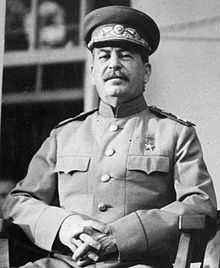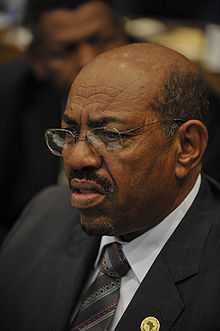Dictator



A dictator is a ruler who wields absolute authority. A state ruled by a dictator is called a dictatorship. The word originated as the title of a magistrate in ancient Rome appointed by the Senate to rule the republic in times of emergency (see Roman dictator and justitium).[1]
Like the term "tyrant" (which was originally a respectable Ancient Greek title), and to a lesser degree "autocrat", "dictator" came to be used almost exclusively as a non-titular term for oppressive, even abusive rule, yet had rare modern titular use.
In modern usage, the term "dictator" is generally used to describe a leader who holds and/or abuses an extraordinary amount of personal power, especially the power to make laws without effective restraint by a legislative assembly. Dictatorships are often characterised by some of the following traits: suspension of elections and of civil liberties; proclamation of a state of emergency; rule by decree; repression of political opponents without abiding by rule of law procedures; these include single-party state, and cult of personality.
The term "dictator" is comparable to – but not synonymous with – the ancient concept of a tyrant; initially "tyrant", like "dictator", did not carry negative connotations. A wide variety of leaders coming to power in a number of different kinds of regimes, such as military juntas, single-party states and civilian governments under personal rule, have been described as dictators. They may hold left or right-wing views, or can even be apolitical.
Roman origin

In the Roman Republic the term "Dictator" did not have the negative meaning it has later assumed. Rather, a Dictator was a person given sole power (unlike the normal Roman republican practice, where rule was divided between two equal Consuls) for a specific limited period, in order to deal with an emergency. At the end of his term, the Dictator was supposed to hand power over to the normal Consular rule and give account of his actions – and Roman dictators usually did.
The term started to get its modern negative meaning with Cornelius Sulla's ascension to the dictatorship following Sulla's second civil war, making himself the first Dictator in more than a century (during which the office was ostensibly abolished) as well as de facto eliminating the time limit and need of senatorial acclamation, although he avoided a major constitutional crisis by resigning the office after about one year due to poor health, dying shortly after. Caesar followed the example in 49 BC and in February 44 BC was proclaimed Dictator perpetuo, "Dictator in perpetuity", officially doing away with any limitations on his power, which he kept until his assassination the following month.
Garibaldi as a positive dictator
Still, even in the 19th Century, the term "Dictator" did not always have negative connotations. For example, the Italian revolutionary Garibaldi, during his famous Expedition of the Thousand in 1860, proclaimed himself "Dictator of Sicily", which did not prevent him from being extremely popular in Italian and international public opinion. His usage of the term was clearly derived from the original Roman sense – i.e., a person taking power for a limited time in order to deal with an emergency (in this case, the need to unite Italy) and with the task done Garibaldi handed over power to the government of Victor Emmanuel II of Italy. A few years later, during the Polish January Uprising of 1863, General Romuald Traugutt also bore the title of "Dictator" as an official and positive designation - possibly directly influenced by the then fresh example of Garibaldi.
Garibaldi's case was, however, an exception. In general, the term "dictator" came to be a negative term, not a title used by rulers to call themselves but a term used by the foes of an oppressive ruler. Such was the case with Maximillien Robespierre, whose supporters knew him as "The Incorruptible", while his opponents called him "dictateur sanguinaire", French for "bloodthirsty dictator".
Modern era

In popular usage in western nations, "dictatorship" is often associated with brutality and oppression. As a result, it is often also used as a term of abuse for political opponents. The term has also come to be associated with megalomania. Many dictators create a cult of personality and have come to favor increasingly grandiloquent titles and honours for themselves. For instance, Idi Amin Dada, who had been a British army lieutenant prior to Uganda's independence from Britain in October 1962, subsequently styled himself as "His Excellency, President for Life, Field Marshal Al Hadji Doctor[A] Idi Amin Dada, VC,[B] DSO, MC, Conqueror of the British Empire in Africa in General and Uganda in Particular".[3] In the movie "The Great Dictator" (1940), Charlie Chaplin satirized not only Adolf Hitler but the institution of dictatorship itself.
The association between the dictator and the military is a common one; many dictators take great pains to emphasize their connections with the military and often wear military uniforms. In some cases, this is perfectly legitimate; Francisco Franco was a lieutenant general in the Spanish Army before he became Chief of State of Spain; Manuel Noriega was officially commander of the Panamanian Defense Forces. In other cases, the association is mere pretense.
Modern use in formal titles
Because of the negative associations, modern leaders very rarely (if ever) use the term in their formal titles. In the 19th century, however, official use was more common:

- Italy
- In the former city-state Venice, and while it was a republic resisting annexation by either the kingdom of Piedmont-Sardinia or the Austrian empire, a former Chief Executive (president, 23 March 1848 – 5 July 1848), Daniele Manin (b. 1804 – d. 1857), was styled Dictator 11–13 August 1848 before joining the 13 August 1848 – 7 March 1849 Triumvirate.
- Philippines
- Emilio Aguinaldo, the last President of the Supreme Government Council 23 March 1897 – 16 December 1897 and chairman of the Revolutionary Government from 23 June to 1 November 1897, was dictator from 12 June 1898 – 23 January 1899.[5]
- Poland
- Józef Chłopicki was styled Dictator from 5 December 1830 – December 1830 and again in December 1830 – 25 January 1831
- Jan Tyssowski was Dictator from 24 February 1846 – 2 March 1846.
- Ludwik Mierosławski was Dictator from 22 January 1863 – 10 March 1863
- Marian Langiewicz was Dictator from 10 March 1863 – 19 March 1863
- An Executive Dictatorial Commission of three members existed from 19 March 1863 – 20 March 1863
- Romuald Traugutt was Dictator from 17 October 1863 – 10 April 1864
- Russia during the Civil War
- Nazarov was Dictator of the Don Republic (which before, since its founding on 2 December 1917 at Novocherkassk, had been governed by a Triumvirate including the last pre-Soviet Ataman, Aleksei Maksimovich Kaledin) from 11 February 1918 till 25 February 1918 when Bolshevik troops ended their existence
- Prince N. Tarkovsky was Dictator of the Mountainous Republic of the Northern Caucasus,
Human rights abuses

Under the dictatorship of Soviet leader Joseph Stalin, tens of millions of people were executed, starved to death or imprisoned in Gulag forced-labour camps.[7]
Pol Pot became leader of Cambodia in 1975. In all, an estimated 1.7 million people (out of a population of 7 million) died due to the policies of his three-year dictatorship.[8] As a result, Pol Pot is sometimes described as "the Hitler of Cambodia" and "a genocidal tyrant".[9] Hun Sen is widely viewed as a dictator that has assumed authoritarian power in Cambodia using violence and intimation and corruption to maintain his power base.[10][11][12]
The International Criminal Court issued an arrest warrant for Sudan's military dictator Omar al-Bashir over alleged war crimes in Darfur.[13]
Personality and drivers
Professor Fred Coolidge says that many dictators are driven by a combination of personality disorders of genetic origin, such as narcissism, paranoia and anti-social personality. They can also help staying in power. For example, paranoid Dr. François Duvalier, "Papa Doc", escaped at least six attempted murders. [14]
Psychopathic features
Dictators have many psychopathic features but they are usually not psychopaths. [15]
Dictators lie to themselves and others, For example, Gaddafi seemed to believe that the people would die for him and that opposition to him would threaten the very existence of Libya. [15]
Real psychopaths do not seem to have feelings, dictators do. Psychologist Scott Atran's studies suggest that leaders who "valorize a muscular and often brutal leadership style" are driven by an impulse toward morality rather than by self-interest of sadism. [15]
Unrealistic heroic bubble
Dictators start to view the world in a simplistic, unrealistic way, living in a bubble and with nobody to criticize their views. This makes their behavior progressively worse as time passes on. They live in a fantasy where they are heroes. This may be why Saddam Hussein, Hitler, Mubarak and others did not negotiate or flee but fought till the end. [15]
Power changes people
Young Robert Mugabe is said to have been ascetic, polite and a careful listener.[15] Power seems to make people worse at listening to others and make them believe that random events were their achievements.[16]
Lack of stress
A research group suspects that power reduces stress and cortisol. Therefore powerful people may have reserve capacity for stressful activities such as lying, and they may feel less regret. [15]
Dictators in game theory
In social choice theory, the notion of a dictator is formally defined as a person who can achieve any feasible social outcome he/she wishes. The formal definition yields an interesting distinction between two different types of dictators.
- The strong dictator has, for any social goal he/she has in mind (e.g. raise taxes, having someone killed, etc.), a definite way of achieving that goal. This can be seen as having explicit absolute power, like Sulla.
- The weak dictator has, for any social goal he/she has in mind, and for any political scenario, a course of action that would bring about the desired goal. For the weak dictator, it is usually not enough to "give their orders", rather he/she has to manipulate the political scene appropriately. This means that the weak dictator might actually be lurking in the shadows, working within a political setup that seems to be non-dictatorial. An example of such a figure is Lorenzo the Magnificent, who controlled Renaissance Florence.
Note that these definitions disregard some alleged dictators who are not interested in the actual achieving of social goals, as much as in propaganda and controlling public opinion. Monarchs and military dictators are also excluded from these definitions, because their rule relies on the consent of other political powers (the barons or the army).
See also
- Dictator novel
- List of coups d'état and coup attempts
- List of coups d'état and coup attempts by country
- List of political leaders who held active military ranks in office
- List of political leaders who suspended the constitution
- Lists of state leaders by year
- Military rule (disambiguation)
- Supreme Leader (disambiguation)
Notes
- A ^ He conferred a doctorate of law on himself from Makerere University.[17]
- B ^ The Victorious Cross (VC) was a medal made to emulate the British Victoria Cross.[18]
References
- ↑ "dictator – Definition from the Merriam-Webster Online Dictionary". www.merriam-webster.com. Retrieved 2008-08-01.
- ↑ Liberty and justice for some at Economist.com
- ↑ Keatley, Patrick (18 August 2003). "Obituary: Idi Amin". The Guardian (London). Retrieved 2008-03-18.
- ↑ "The Five Worst Leaders In Africa". Forbes. February 9, 2012.
- ↑ Philippine Legislature:100 Years, Cesar Pobre
- ↑ "The world's enduring dictators". CBS News. May 16, 2011.
- ↑ Conquest, Robert (2007) The Great Terror: A Reassessment, 40th Anniversary Edition, Oxford University Press, in Preface, p. xvi: "Exact numbers may never be known with complete certainty, but the total of deaths caused by the whole range of Soviet regime's terrors can hardly be lower than some fifteen million."
- ↑ "Top 15 Toppled Dictators". Time. October 20, 2011.
- ↑ William Branigin, Architect of Genocide Was Unrepentant to the End The Washington Post, April 17, 1998
- ↑ http://www.hrw.org/news/2012/11/18/speak-truth-cambodias-dictator Retrieved September-29-2013
- ↑ http://www.economist.com/news/asia/21566658-few-days-centre-stage-hun-sen-cambodias-dictator-may-not-be-entirely-welcome-tenth-out Retrieved September-29-2013
- ↑ http://www.reuters.com/article/2013/09/18/us-cambodia-hunsen-analysis-idUSBRE98H04K20130918 Retrieved September-29-2013
- ↑ "Sudanese dictator Omar al-Bashir faces war crimes charges". The Daily Telegraph. July 14, 2008.
- ↑ The Dictator: Why do autocrats do strange things?, Helier Cheung, BBC News, 14 May 2012.
- ↑ 15.0 15.1 15.2 15.3 15.4 15.5 The Psychology of Dictatorship: Why Gaddafi Clings to Power, Time, May 26, 2011.
- ↑ Could You Become a Dictator?, Stephanie Pappas, Live Science, February 11, 2011.
- ↑ "Idi Amin: a byword for brutality". News24. 2003-07-21. Retrieved 2007-12-02.
- ↑ Lloyd, Lorna (2007) p.239
Bibliography
- Bunce & Wolchik, Valerie, Sharon L. (2012). Socialism Vanquished, Socialism Challenged: Eastern Europe and China, 1989-2009. Oxford University Press. Retrieved 5 March 2013.
- Issac, Jeffrey C. (2000). Between Past and Future: The Revolutions of 1989 and Their Aftermath. Central European University Press. Retrieved 5 March 2013.
- Pavlowitch, Stevan K. (2002). Serbia: The History of an Idea. New York, NY: New York University Press. p. 128. ISBN 0-8147-6708-7.
External links
-
 The dictionary definition of dictator at Wiktionary
The dictionary definition of dictator at Wiktionary - WorldStatesmen